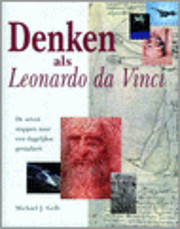

Fai clic su di un'immagine per andare a Google Ricerca Libri.
|
Sto caricando le informazioni... Pensare come Leonardo: i sette principi del genio (1998)di Michael J. Gelb
 Sto caricando le informazioni...
Iscriviti per consentire a LibraryThing di scoprire se ti piacerà questo libro. Attualmente non vi sono conversazioni su questo libro. Leonardo started a lot of projects that he never finished -- but the ones he did finish are amazing. The author, after examining Leo's life, saw that there were seven habits or characteristics that seemed to guide da Vinci and make him the Renaissance man that he was. The purpose of this book is not to make us feel inadequate by comparing ourselves to the Maestro, but to give us a path to follow, so that we may emulate him in our lives as much as possible. The one drawback that our bookclub sees: we don't have wealthy patrons putting us up and giving us free rein to explore what we want. by reading this book I have discovered that I have a lot to improve on, but also that I've already been living according to some da Vincian principles. Yay me! Ok, so most of the self-help, self-improvement books out there are complete bunk and just full of outrageously obvious or deluded truisms (or, not-so-truisms). But I've found Michael Gelb's writings to be consitently worthwhile. Yes, it's a bit silly to think you can "think like Leonardo," but there are some interesting tricks you can use to make yourself open up your mind just a little bit more and a lot of great things you can learn about yourself by exposing yourself to new experiences. That's mostly what this book is about: self-understanding through self-expanding. nessuna recensione | aggiungi una recensione
Michael Gelb's How to think like Leonardo Da Vinci is an inspiring and inventive guide that teaches readers how to develop their full potential, using the principles of Da Vincian thought identified by the author. Beginning with a brief historical biography of Da Vinci and an overview of the astounding advances made in the arts and sciences during the Renaissance, Gelb illustrates the seven fundamental elements of Da Vinci's thought process: Questionare: A questing, insatiably curious approach to life Dimostrazione: A commitment to test knowledge through experience Sensazione: The continual refinement of the senses, especially sight, as the means to clarify experience Sfumato: A willingness to embrace ambiguity, paradox and uncertainty Arte/Scienza: The development of the balance between science and art, logic and imagination. "Whole-brain" thinking Corporalita: The cultivation of ambidexterity, fitness and poise Connessione: A recognition and appreciation for the interconnectedness of all things and phenomena. Non sono state trovate descrizioni di biblioteche |
Discussioni correntiNessunoCopertine popolari
 Google Books — Sto caricando le informazioni... Google Books — Sto caricando le informazioni...GeneriSistema Decimale Melvil (DDC)153.35Philosophy and Psychology Psychology Cognition And Memory Creativity And Visualization CreativityClassificazione LCVotoMedia: (3.79) (3.79)
Sei tu?Diventa un autore di LibraryThing. |
||||||||||||||||||||||||||||||||||||||||||||||||||||||||||||||||||||||||||||||||||||||||||||||||||||||||||||||||||||||||
The book is divided into three parts: Part One includes a concise biography and list of Leonardo's accomplishments; while Part Two focuses on the "Seven Da Vincian Principles" that include curiosity, a focus on the senses, use of ambiguity and development of whole-brain thinking. While the principles are not unique to Leonardo, this presentation is particularly effective and helpful. Part Three discusses the art of drawing and perspective which is at the heart of Leonardo's art. The inclusion of a chronology of Leonardo's life, which spanned the last half of the fifteenth century into the first decades of the sixteenth, and a topical bibliography of recommended reading increases the value of this truly inspirational book. (less)
FRIEND REVIEWS (1) (